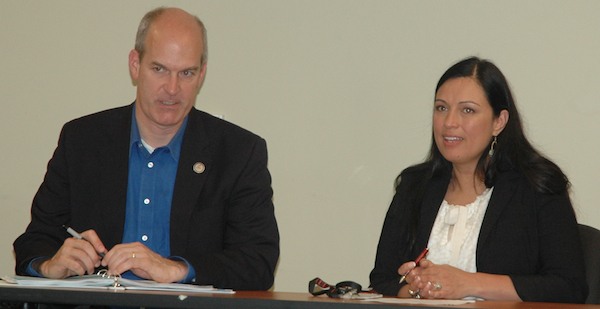TULALIP — When Tulalip Tribal Vice Chair Deborah Parker joined U.S. Senators Patty Murray, Barbara Boxer and Amy Klobuchar in Washington, D.C., to advocate the passage of the reauthorization of the Violence Against Women Act on April 25, the Senate passed the VAWA reauthorization bill by a vote of 68-31 the very next day.
When U.S. Rep. Rick Larsen met with Parker and a host of representatives from regional organizations that assist victims of domestic violence on June 12, the news he had to offer on the bill’s progress through the House of Representatives was not nearly as positive.
“In a very partisan vote, House Republicans voted to roll back the protections for Native Americans, immigrants and LGBT individuals that had been part of the Senate’s Violence Against Women Act,” Larsen said. “Because of this failure to include these groups in the House version of the bill, I had to vote against it, because I don’t want to strengthen the hands of abusers.”
Parker, a survivor of domestic violence who met with both Murray and U.S. Sen. Maria Cantwell just days prior to the Senate vote on the Violence Against Women Act, received so many statistics and letters recounting the abuse suffered by many Native American women that she came to realize that the problem of domestic violence was even greater than she’d known.
“Those numbers just blew me away,” Parker said, noting that 88 percent of violence against Native American women is committed by non-Native men. “They’re way too high. One woman even came to me in a parking lot to tell me what she’d been through. I went through the same, but our next generation should have a step up. Our Indian woman are just as important as any other women, and they deserve the same amount of respect.”
Parker reiterated her contention that Congress should improve the tribes’ ability to bring non-Indians who live and commit crimes against women on tribal lands to justice, as part of the tribes’ treaty rights.
Vicci Hilty, deputy director of Domestic Violence Services of Snohomish County, described herself as “horrified” at the House version of the Violence Against Women Act, which she sees as “discarding” Native American women and LGBT individuals.
“All our sisters are important and all victims deserve recognition,” Hilty said. “My mother burned her bra in the 1960s, but it seems like we have to fight for so many of the same rights today. I thought we were past this.”
Dr. Dale Todd of Phoenix Counseling Consultants has 14 years of experience in his field in Snohomish County, and he echoed Hilty’s concerns that “we’re going backward” in terms of societal attitudes toward domestic violence. Cyndi Peterson Todd, his wife and partner in Phoenix Counseling Consultants, called for more perpetrators of domestic violence to be sent to counseling and be held accountable for their actions.
When asked why the Senate and House votes on the Violence Against Women Act turned out so differently, Larsen explained that the Senate version of the bill passed with more than 60 cosponsors, “enough to make it uncomfortable for those who might have opposed it otherwise,” whereas the House affords no such structural mechanism to prevent potential filibusters.
“I don’t want to question my colleagues’ motives, but some members of the House believed that these conditions ought not to apply,” Larsen said. “But the Constitution gives Congress broad authority to set tribal jurisdictions. We should be able to find a way for no one to be left unprotected.”
Larsen encouraged those in attendance, and those in the surrounding community, to put pressure on Congress by emphasizing that “it’s not enough that Congress pass just any version of the Violence Against Women Act, but that they pass one which strengthens protections for those who are left vulnerable.”



